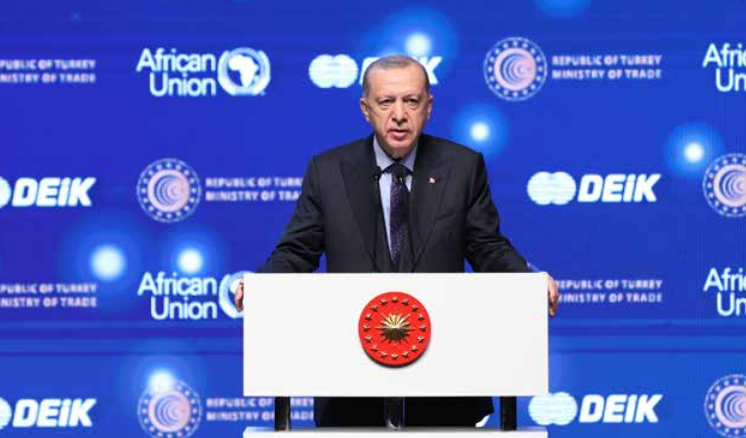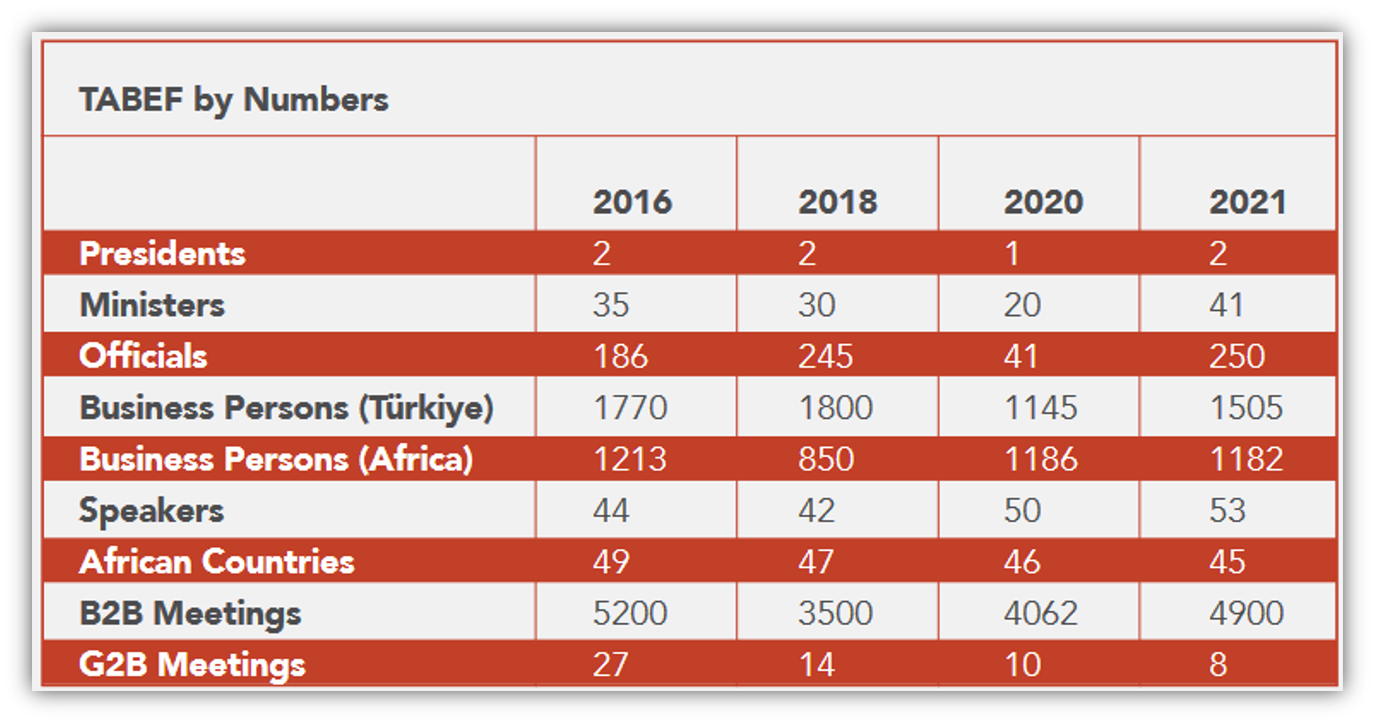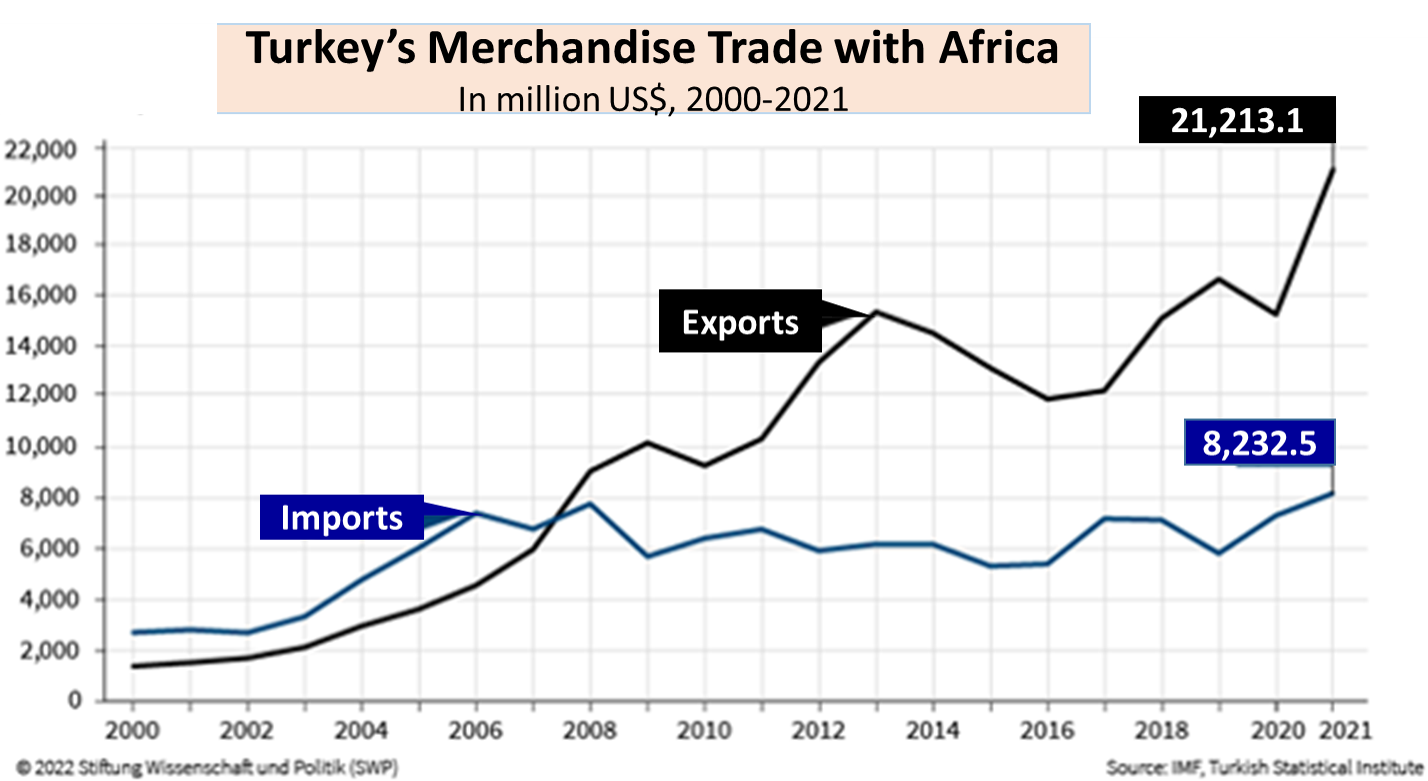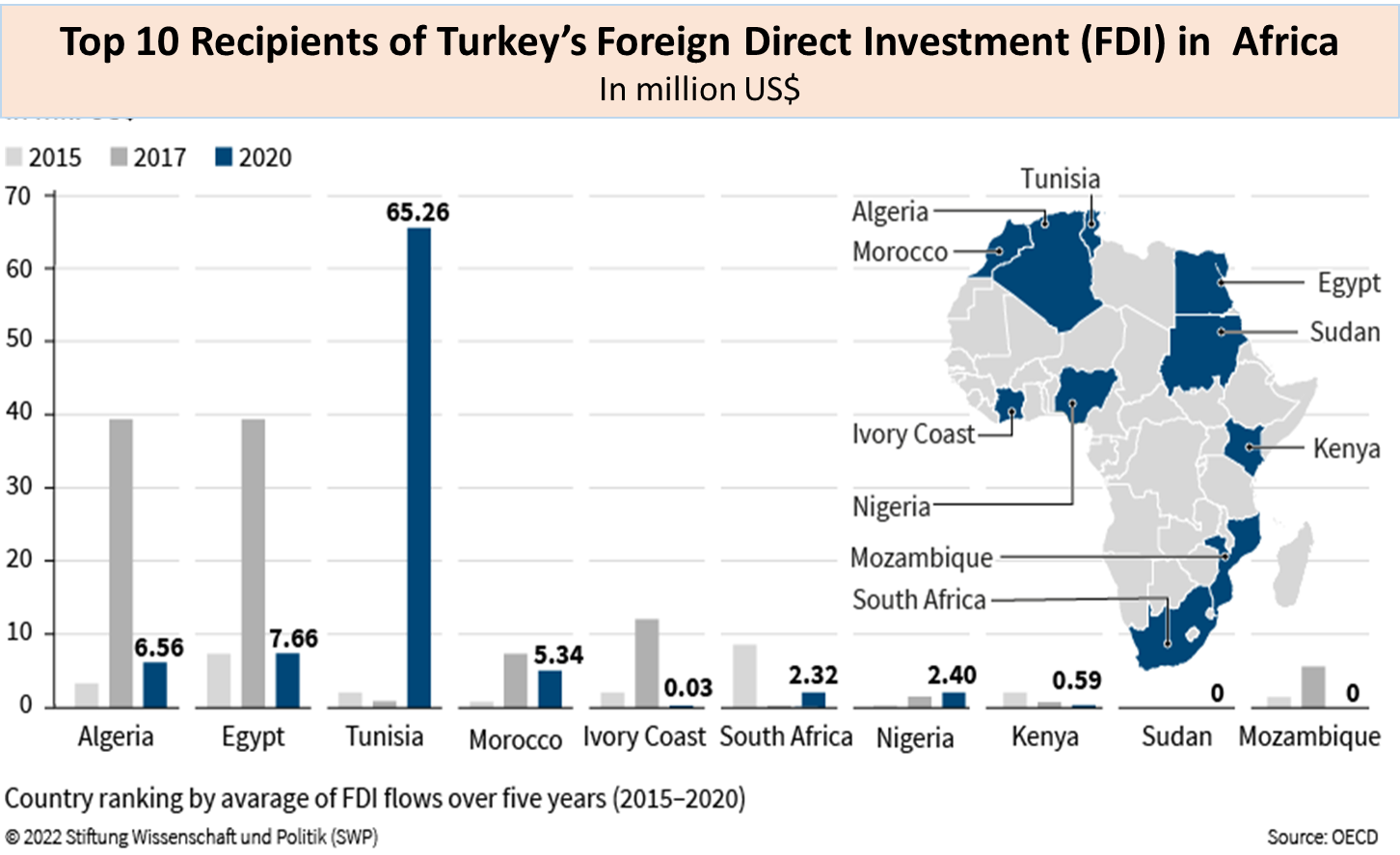Turkey-Africa: Strengthening business and economic relations
Aliu Mahama Braimah, Ph.D., Istanbul, Turkey
May 02, 2024
T he fourth Turkey Africa Business and Economic Forum (TABEF) took place on October 12th-13th, 2023, in Istanbul. On this occasion, the Turkish Ministry of Trade, the Foreign Economic Relations Board of Turkey (DEİK) and the African Union Commission (AU) and co-organized the bi-annual event. Since its inception, TABEF has become a networking opportunity for Turkey and African countries, where they meet, explore business partnerships and deepen socio-economic collaboration1.

Recep Tayyip Ergogan, President of Turkey, Photo© DEİK
The First Turkey-Africa Economic and Business Forum took place in İstanbul, on 2nd-3rd November 2016. Trade and economy ministers from 42 African countries, as well as over 2,000 business leaders and officials, attended the Forum. The Second Forum also held in Istanbul on October 10th-11th, 2018 and attracted over 2,500 business people from the continent.
But because of the COVID-19 pandemic, the Turkey-Africa Economic and Business Forum was a virtual event online on 8-9th October 2020. Recep Tayyip Erdogan, the President of Turkey, chaired the virtual Forum, which was attended by 15 trade economy ministers and senior officials from 26 African countries. On the margins of the online edition, the Forum also offered virtual B2B meetings.
Evolution of TABEF

Source:www.tabef.org
Turkey export to and import from Africa
Turkey exports construction equipment, industrial machines and fast moving consumer goods. The country also exports processed food, flour, and wheat. In the telecom field, African countries buy insulated cables and wires and also navigation equipment. In addition, Turkey has become one of the largest exporters of fertilizers to Sub-Saharan Africa. Conversely, Turkish imports include, hydrocarbon, minerals such as gold, agricultural commodities such as cocoa, coffee, cashew nuts, and cotton. Total trade with the region increased from US$5.4 billion in 2003 to US$25.3 billion at the end of 20202 .

Source: Centre for Applied Turkey Studies (CATS), 20232
President Erdogan has set ambitious targets to grow the economic partnership. ‟Our target is to increase trade volume to US$50 billion and then to US$75 billion. I believe we can achieve this goal, working hand in hand”, he announced at the launch of the 2021 TABEF3. Over the past decade, Turkish contracting companies have successfully completed 1,864 projects on the African continent, for a total amount of US$85.4 billion dollars, mostly in infrastructure construction. The rate of investment is accelerating. For 2023 alone, Turkish investments in Africa reached 10 billion dollars while trade volume reached 40.7 billion dollars4.

Source: Centre for Applied Turkey Studies (CATS), 20235
Institutional deployment
Since inception in 2016, TABEF has grown in scope with investment opportunities covering a wide range of areas, including but not limited to energy, agriculture, healthcare, banking, and infrastructure. Public and private institutions have endorsed this re-orientation towards trade.
Turkey Export Import Bank (Exim Bank)
-
• Türk Eximbank’s financing to Africa reached US$1,3 billion in 2021, which represented 40 percent of the overall support provided under the Buyers’ Credit since the inception of the program (Berne Union, 2021). Turkish Eximbank provides direct loans, sovereigns loans or sovereign guarantees. New projects will increase the bank’s trade finance portfolio to US$2.00 billion by 2025.
-
Türk Eximbank’s investment in reached US$1.3 billion in 2021, as the form of direct loan to sovereigns or sovereign guarantee. Infrastructure investment dominates this portfolion and straddles economic sectors including air, sea, and road transport systems. They also include power plants, hotels construction, and shopping malls. Turkish companies have also built sport arenas, harbors, and housing. Well-known projects include the Japoma Stadium (Douala-Cameroon), the Blaise Diagne International Airport (Dakar-Senegal) and Diori Hamani International Airport (Niamey-Niger). Countries such as Rwanda, Ethiopia and Malawi have also benefited from modern infrastructure financed and built by Turkey.
Türk Eximbank also cooperates through reinsurance agreements signed with other eminent ECAs around the World, such as US Exim, UKEF, Bpifrance, OeKB, MEHİB, EKF, EKN. These agreements have increased the levels of support and partnerships in Africa6.
The Turkey Foreign Economic Relations Board (DEIK)
-
• The Turkey Foreign Economic Relations Board (DEIK), runs 45 business councils in African countries and a network of chambers of commerce. Besides, the number of African countries with which Turkey signed bilateral trade and economic cooperation agreements reached 45 in 2017, from 23 in 2003. North Africa dominates Turkey’s Africa trade, but Sub-Saharan Africa has doubled their volume of trade during the same period. Development aid is an important arm of Turkish presence in Sub-Saharan Africa. The Turkish International Development Agency (TIKA) with its branches in 27 countries in Sub-Saharan Africa, manages this area of the cooperation7. Turkey spends 0.54 percent of its GDP on official development aid.
The Turkish Cooperation and Coordination Agency (TİKA)
-
• The Turkish Cooperation and Coordination Agency (TİKA) channels official aid from Turkey to Africa. TİKA has 22 Program Coordination Offices across Africa
Turkish Airlines
-
• Turkish Airlines flies to more than 60 destinations in 39 countries before the pandemic.
Educational Institutions and Foundations
-
• Yunus Emre Institute, the Turkish Maarif Foundation, the Turkish Religious Foundation, offer education, Turkish language and religious education. These institutions offer nursery, primary and secondary education and help African students to gains education in Turkish Universities. Türkiye has awarded more than 15.000 African students graduate, post-graduate and doctorate scholarships since 1992.
Diversification
Exchanges with the continent are diversifying into education and defense. While trade continues to increase, Turkey is also becoming a prime destination for African students. Since 1992, Turkey has provided undergraduate, graduate, and doctorate scholarships to 8.000 African students. The country host 5.437 students in higher education and 116 visiting professors and research assistants from African countries.
African countries have signed defense agreements with Turkey and are buying military equipment made in Turkey. During the 2021 Forum, the Turkish President announced that ‟The defense industry products produced by Turkey contribute a lot to the border security of African peoples and their fight against terror”8. The German Institute for International and Security Affairs reports that Turkey’s defense and aerospace exports to Africa reached US$460.6 million in 2021, compared to US$82.981 million the previous year9.
Related Articles
BIBLIOGRAPHY
1❩ TABEF Report (2021) - https://www.deik.org.tr/uploads/tabef-rapor-1-2.pdf
2❩ H. A. Aksoy, S. Çevik, N. T. Yaşar (2022): Visualizing Turkey’s Activism in Africa - https://www.cats-network.eu/topics/visualizing-turkeys-activism-in-africa#c8231
3❩ Recep Tayyip Ergogan (2023): “Africa has an exceptional place in our hearts", DEIK Report http://www.turkeyafricaforum.org/
4❩ https://www.deik.org.tr/press-releases-minister-bolat-our-trade-volume-with-africa-reached-40-7-billion-dollars
5❩ https://tika.gov.tr/en/region/sub-saharan-africa/
6❩Berne Union (2021): Türk Eximbank’s Experience in Sub-Saharan Africa - https://www.berneunion.org/Articles/Details/582/Turk-Eximbanks-Experience-in-Sub-Saharan-Africa
7❩ CATS ibid.
8❩ Nebahat Tanrıverdi Yaşar (2022): Unpacking Turkey’s Security Footprint in Africa - https://www.swp-berlin.org/publications/products/comments/2022C42_Turkey_Security_Africa.pdf
9❩ Nebahat Tanrıverdi Yaşar (): Unpacking Turkey’s Security Footprint in Africa: Trends and Implications for the EU. - https://www.swp-berlin.org/10.18449/2022C42/
